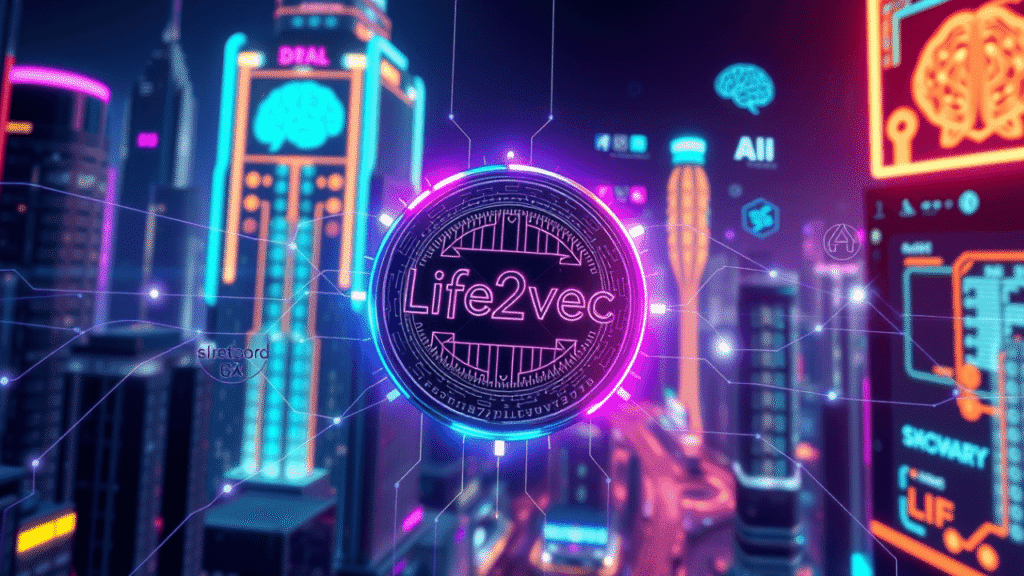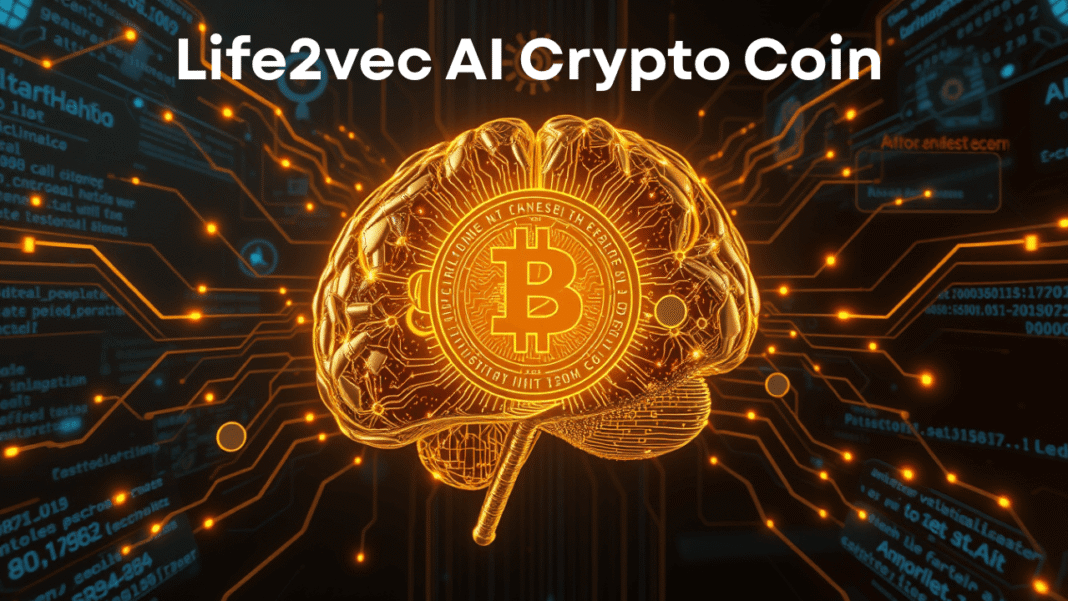Let’s talk about the buzzword salad that’s got everyone in tech and crypto circles fired up: Life2vec. Mix some AI, stir in big data, and top it off with a sprinkle of cryptocurrency, and you’ve got a recipe that sounds straight out of a sci-fi investor pitch. But what is this Life2vec AI Crypto Coin everyone’s tweeting about? Is it the next Bitcoin—or just another blockchain fantasy?
What Exactly Is Life2vec, Anyway?
Alright, before we jump headfirst into the crypto stuff, we need to understand the brains behind the buzz: the Life2vec model itself.
Created by some very smart folks over at the Technical University of Denmark—led by Professor Sune Lehmann—Life2vec is an AI model with a pretty ambitious goal: predicting the trajectory of your life using anonymized personal data. Yes, really.
And we’re not just talking about your Spotify history. This model chews through massive datasets that include:
- Education details (like your GPA and major)
- Medical records (medications, surgeries, hospital visits—you name it)
- Job history (roles, salaries, how often you job-hop)
- Your social life (relationships, social networks, how you communicate)
- And even where you live or how often you move
It’s like your entire life mapped out in data points. Life2vec processes all that info using transformer-based deep learning tech (think of it as GPT for life prediction). From there, it starts making surprisingly accurate guesses about your future—like how long you might live or whether your career path is heading toward success… or not.
The Coin That Isn’t (Yet): What’s the Deal With the Life2vec AI Crypto Coin?

Now, let’s talk crypto—because that’s where things get a little murky.
So far, the idea of a Life2vec AI Crypto Coin is still floating in the speculative ether. There’s no official token. No blockchain platform from the creators. Nada. In fact, the team at DTU (that’s the Technical University of Denmark) has explicitly said: “No, we’re not launching a coin.” They’ve even called out fake sites—like life2vec[dot]io and life2vecai[dot]com—that are trying to ride the hype train.
What we’re seeing instead is a wave of memecoins and community-generated tokens trying to latch onto Life2vec’s popularity. Sites like Pump.fun (a Solana-based memecoin generator) are hosting projects named “Life2vec AI Coin,” but these have no connection to the real AI model.
Bottom line? If someone’s trying to sell you Life2vec tokens claiming they’re official—walk away. Or better yet, run.
Why Is Everyone So Obsessed With Turning Life2vec Into a Crypto?
Here’s why people can’t stop talking about Life2vec as a coin—even though it doesn’t exist yet.
Life2vec touches on everything crypto fans love:
- Innovation: It’s a bleeding-edge AI model
- Data as currency: What if you could earn tokens by sharing your life data anonymously?
- Utility tokens: Think of a system where holding a coin gives you access to personalized predictions about your health, career, or relationships
Cool concept, right? But again, completely hypothetical.
Still, that hasn’t stopped websites and influencers from hyping up the idea. One such project on Pump.fun launched in December 2024, complete with a Life2vec-style coin—but again, DTU had nothing to do with it. Crypto commentator Antony Threecores has even warned investors to stay clear of these copycat tokens.
The Tech Behind the Model: Why It’s a Big Deal
So why is Life2vec drawing so much attention in the first place?
It’s the model’s performance. Life2vec outperforms traditional actuarial methods—by a long shot. When predicting mortality over a four-year window for individuals aged 35 to 65, it scored an accuracy rate of 78.8%. That’s significantly higher than older models stuck in the 60% range.
It also nailed other life outcomes like:
- Predicting international migration (accuracy: 73%)
- Understanding characteristics like health risks or career stability based on user data
- Making career and relationship predictions
We’re not talking about a crystal ball here—it’s more like an ultra-sophisticated trends analyzer that helps identify where someone’s life might be headed based on patterns.
So What If There Was a Life2vec Crypto Coin? What Would It Look Like?
Let’s play with the idea for a moment. If Life2vec did decide to jump into the crypto world, what could that look like?
1. Data-for-Tokens Model
Users could get paid in tokens for sharing anonymized life data. That data could improve the model’s predictions, while users benefit financially.
2. Personalized AI Insights
Want to know your health risk based on your data? Career moves? Relationship chances? Spend some tokens to access hyper-personalized predictions. (Think: AI meets horoscope—but with actual data.)
3. Decentralized Data Marketplace
Researchers and developers could buy access to anonymized data using tokens, while contributors get a cut.
4. Community Governance
Token holders could vote on how the AI is developed, deployed, or updated—a decentralized approach to a very powerful system.
Sounds futuristic, right? But it also comes with a laundry list of challenges.
Here’s the Catch: Real-World Problems and Red Flags
Even the most exciting ideas need reality checks. A Life2vec crypto coin would face major hurdles:
- Privacy: Sensitive life data—no matter how anonymized—is still at risk if hacked or mishandled.
- Decentralization Dilemma: Can you really decentralize something as complex and sensitive as Life2vec AI?
- Speculation Risk: If the coin gains hype, its value might spike for all the wrong reasons. You end up with volatility instead of utility.
- Ethical Concerns: Wealthy individuals could hoard tokens for better access to life predictions, skewing fairness.
- Regulatory Roadblocks: This kind of hybrid model would attract intense scrutiny from regulators, especially around data protection and AI ethics.
Life2vec’s Broader Uses—Beyond Crypto
Even without the coin, Life2vec has huge implications.
🔹 Public Health
It could help governments identify population health risks before they spiral into crises.
🔹 Personalized Medicine
Doctors might use predictions to tailor treatment plans to individual needs.
🔹 Education & Career Counseling
Students could get personalized career advice based on their academic and social history.
🔹 Insurance & Risk Assessment
Yes, insurers could use it too—but this raises red flags around discrimination and algorithmic bias.
That’s why the folks behind Life2vec emphasize transparency, fairness, and ethical use. Without these, the model could do more harm than good.
The Ethics Maze: A Tool This Powerful Needs Guardrails
We can’t gloss over the serious ethical concerns Life2vec raises:
- Re-identification risks: Even anonymized data can sometimes be linked back to individuals.
- Bias baked into data: If historical data is biased, the predictions will be too.
- Employment or insurance discrimination: What happens when an AI says you’re “high risk”?
- Self-fulfilling prophecies: Someone told their future looks bleak may stop trying—and make the prediction come true.
AI needs ethics like fire needs water—essential to prevent burnouts and blowups.
So… Is Life2vec Crypto Just a Dream?
At this moment? Yep. It’s just an idea—an intriguing one, sure—but no more than that.
Still, it opens up fascinating questions about how we treat our personal data. Could we own it? Trade it? Use it to shape our lives? And if crypto becomes part of that equation—how do we keep it safe, fair, and useful?
Conclusion: Stay Curious, But Stay Cautious
The Life2vec AI Crypto Coin sounds like the future knocking on your door. But for now, it’s not real—and any token claiming otherwise should be viewed with extreme skepticism.
This is a rapidly evolving space where AI, data, and decentralized finance are all colliding. That makes it both exciting and risky. Before you buy into any coin or project, ask questions. Demand transparency. Do your homework.
In short: don’t let the crypto glitter blind you to the ethical and technical realities.
Because in the end, it’s not just about predicting your future—it’s about protecting it.



